
"Crazy Little Thing Called Love" is a song by the British rock band Queen. Written by Freddie Mercury in 1979, the track is included on their 1980 album The Game, and also appears on the band's compilation album Greatest Hits in 1981. The song peaked at number two in the UK Singles Chart in 1979, becoming the group's first number-one single on the Billboard Hot 100 in the US in 1980, remaining there for four consecutive weeks. It topped the Australian ARIA Charts for seven weeks. It was the band's final single release of the 1970s.

"The Sound of Silence", originally "The Sounds of Silence", is a song by the American music duo Simon & Garfunkel, written by Paul Simon. The duo's studio audition of the song led to a record deal with Columbia Records, and the original acoustic version was recorded in March 1964 at Columbia Studios in New York City for their debut album, Wednesday Morning, 3 A.M. Released on October 19, 1964, the album was a commercial failure and led to the duo disbanding; Simon returned to England, and Art Garfunkel to his studies at Columbia University.

"Light My Fire" is a song by the American rock band the Doors. It was recorded in August 1966 and released in January 1967 on their eponymous debut album. Issued as an edited single on April 24, 1967, it spent three weeks at number one on the Billboard Hot 100 chart, and one week on the Cash Box Top 100, nearly a year after its recording. Due to its erotic lyrics and innovative structure, the song has come to be regarded a synonymous with the 60s psychedelic and sexual revolutions.
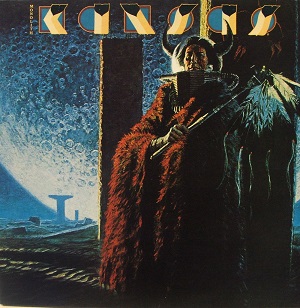
Monolith is the sixth studio album by American progressive rock band Kansas, released in 1979. The album reached No. 10 on the Billboard album charts, marking their third straight studio album to reach the top ten.
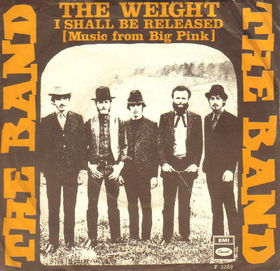
"The Weight" is a song by the Canadian-American group the Band that was released as a single in 1968 and on the group's debut album Music from Big Pink. It was their first release under this name, after their previous releases as Canadian Squires and Levon and the Hawks. Written by Band member Robbie Robertson, the song is about a visitor's experiences in a town mentioned in the lyric's first line as Nazareth. "The Weight" has significantly influenced American popular music, having been listed as No. 41 on Rolling Stone's 500 Greatest Songs of All Time published in 2004. Pitchfork Media named it the 13th best song of the 1960s, and the Rock and Roll Hall of Fame named it one of the 500 Songs that Shaped Rock and Roll. PBS, which broadcast performances of the song on Ramble at the Ryman (2011), Austin City Limits (2012), and Quick Hits (2012), describes it as "a masterpiece of Biblical allusions, enigmatic lines and iconic characters" and notes its enduring popularity as "an essential part of the American songbook."

"I Want You to Want Me" is a song by the American rock band Cheap Trick. It is originally from their second album In Color, released in September 1977. It was the first single released from that album, but it did not chart in the United States in its original studio version, which was influenced by music hall styles.

"My Sharona" is the debut single by the Knack. The song was written by Berton Averre and Doug Fieger, and it was released in 1979 from their debut album, Get the Knack. It reached number one on the Billboard Hot 100 singles chart, where it remained for six weeks, and was number one on Billboard's 1979 Top Pop Singles year-end chart.

"Feelin' Satisfied" is a song by American rock band Boston, released as a single in 1979, and written by Tom Scholz from their 1978 album Don't Look Back. "Feelin' Satisfied" was released as a single and went up to #46 on the Billboard Hot 100. It only reached #84 in Canada. It was the band's last single release for 7 years, until "Amanda" in 1986.

"Message in a Bottle" is a song by English rock band the Police. It was released as the lead single from their second studio album, Reggatta de Blanc (1979). Written by the band's lead singer and bassist Sting, the song is ostensibly about a story of a castaway on an island, who sends out a message in a bottle to seek love. A year later, he has not received any sort of response, and despairs, thinking he is destined to be alone. The next day, he sees "a hundred billion bottles" on the shore, finding out that there are more people like him out there. Over the course of the song, Sting mentions sending an S.O.S. 31 times.

"Mr. Blue Sky" is a song by the Electric Light Orchestra (ELO), featured on the band's seventh studio album Out of the Blue (1977). Written and produced by frontman Jeff Lynne, the song forms the fourth and final track of the "Concerto for a Rainy Day" suite on side three of the original double album. "Mr. Blue Sky" was the second single to be taken from Out of the Blue, peaking at number 6 in the UK Singles Chart and number 35 in the US Billboard Charts.

"Hello, I Love You" is a song recorded by American rock band the Doors for their 1968 album Waiting for the Sun. Elektra Records released it as a single that same year, which topped the charts in the U.S. and Canada. Although the Doors are credited as the songwriters, songs by other artists have been identified as likely sources.
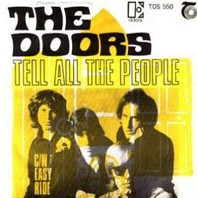
"Tell All the People" is a song by American rock band the Doors and was written by band guitarist Robby Krieger. It was the A-side backed with "Easy Ride" – an outtake from Waiting for the Sun recorded in March 1968 – and was released in June 1969. Also known as "Follow Me Down" due to the use of the phrase, it was the third single from the Doors' fourth album The Soft Parade. The song's instrumentation incorporates brass instruments and other orchestral instruments.
New England is an American rock band, who were best known in the US for their first single, "Don't Ever Wanna Lose Ya", which received heavy radio exposure on Album-oriented rock (AOR) stations and reached #40 on the Billboard Hot 100 chart in 1979. The follow-up "Hello, Hello, Hello" also received some airplay. New England described their sound as "power-melodic-orchestrated-song-oriented rock"
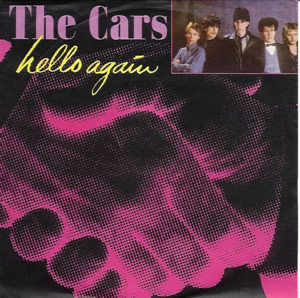
"Hello Again" is a song by American rock band the Cars from their fifth studio album, Heartbeat City (1984). It was released on October 15, 1984, as the album's fourth single. The song was the fourth top-20 entry from the album, reaching number 20 on the Billboard Hot 100 chart; it also reached number eight on the Hot Dance/Disco chart and number 22 on the Top Rock Tracks chart. Ric Ocasek sings lead vocals on the track.

"Double Vision" is a single by Foreigner from their second album of the same name. The song reached No. 2 on the Billboard Hot 100 chart for two weeks in 1978, behind "MacArthur Park" by Donna Summer. It became a gold record. The song was also a top 10 hit in Canada.

"Let's Pretend" is a song by Raspberries, released in March 1973 as the second single from their second LP, Fresh. It was written by band leader Eric Carmen, who also provided the lead vocals.
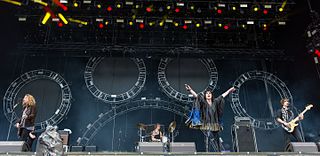
The Struts are a British rock band formed in Derby, Derbyshire in 2012. The band consists of lead vocalist Luke Spiller, guitarist Adam Slack, bassist Jed Elliott, and drummer Gethin Davies.

"Rx (Medicate)" is a song performed by Canadian rock band Theory of a Deadman, a track on their sixth studio album, Wake Up Call (2017). The song's lyrics were co-written by all four members of the band and address the prescription drug abuse epidemic occurring in North America. It was produced by Martin Terefe and recorded at Terefe's Kensaltown Studios in London. Along with the group's usual hard rock sound, the song uses elements of pop and country music genres. The band's transition into the pop genre has been associated with lead singer Tyler Connolly's newly acquired piano-playing ability, which forced a change in his songwriting style.

"When I Wake Up Tomorrow" is a song by American rock band Cheap Trick, which was released in 2016 as the second and final single from their seventeenth studio album Bang, Zoom, Crazy... Hello. It was written by Julian Raymond, Robin Zander, Rick Nielsen and Tom Petersson, and produced by Raymond and Cheap Trick. Released as a promotional single in the United States, "When I Wake Up Tomorrow" reached No. 24 on the Billboard Mainstream Rock chart.
"Don't Ever Wanna Lose Ya" is the debut single by American rock band New England, released from their self-titled debut album (1979). Produced by Paul Stanley and Mike Stone, it is their most successful song, reaching at number 40 on the Billboard Hot 100.

















